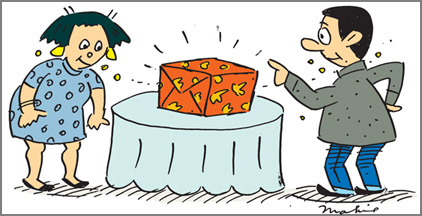World Power
How to use modal verbs
Modal verbs, sometimes referred to as modal auxiliaries, are mainly
used to indicate your attitude towards somebody or something. They have
other uses as well. For instance, you can use modal verbs to make
requests or to express your wishes. Sometimes modals are used when you
wish to be polite.
Modals are usually used along with other verbs. In that sense, they
are auxiliaries.
Susanthika must be the fastest sprinter in Sri Lanka. (You are sure
of it and you cannot think of anyone faster than her.)
Susanthika might be the fastest sprinter in Sri Lanka. (The meaning
is changed. 'might' suggests that you are not sure of your facts).
I cannot go to Jaffna tomorrow. (I am unwilling to go to Jaffna for
some reason.)
"She can cook well" is different from "She cooks well." In the former
sentence she has the ability to cook well, but she may not want to do
so.
When you want to be polite, you do not say, "Open the box" or "Sit
down". They are commands. Use a modal and the commands become polite
requests.
 |
|
Will you open the box? |
Will you open the box?
Would you sit down.
Modals can be used in reported speech.
The Minister said that the fuel price might come down.
He said he would not hesitate to take a decision.
Modals are usually followed by the base form of verbs.
"I can walk now", the patient told the doctor.
The Opposition demanded that the Government must reduce the cost of
living.
You ought to follow the instructions.
A modal may be followed by another auxiliary verb.
Ranasinghe may be hiding in a foreign country.
He must have collected millions of rupees.
The suspect ought to have respected the judge.
Modals cannot be changed by adding "s", "ing" or "ed" to suit the
person or the Tense.
He must go now.
She can sit for the examination next year.
By adding "not" after a modal, you can make it negative.
I cannot help you in this matter. (can + not are written together.)
You must not feel sorry.
She couldn't (could + not) come because she was sick.
You musn't go there again.
He shouldn't have smoked in my presence.
We can't wait here indefinitely.
Questions can be formed with modals.
Can you give me a lift to Borella?
Could you think of a person who is available?
You can use modals in question tags.
Martha can't come now, can she?
"Dare, need" and "used to" are treated as semi-modals.
How dare you call me a fool?
You needn't worry about it.
We used to meet once a week. |
